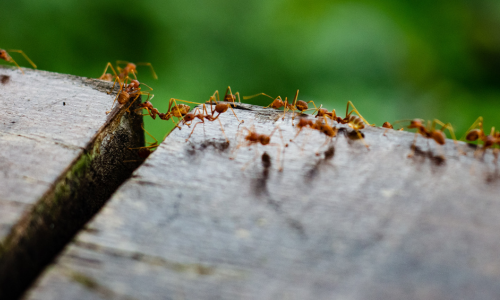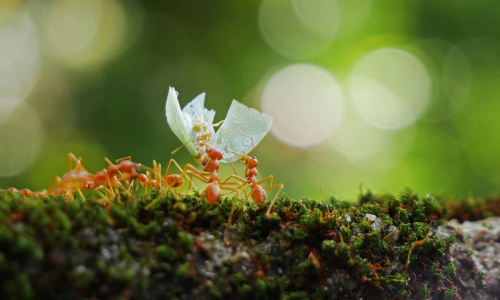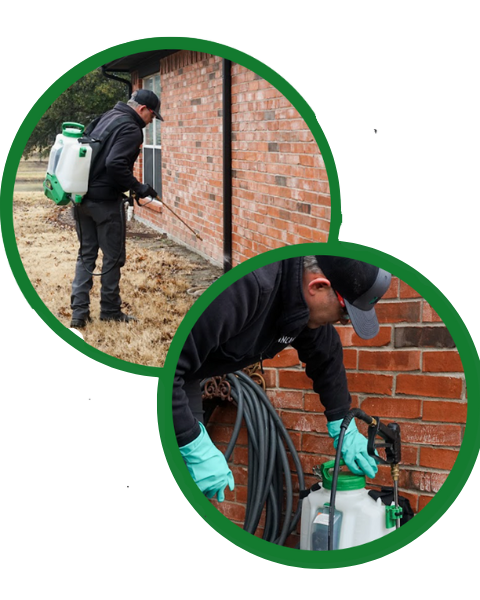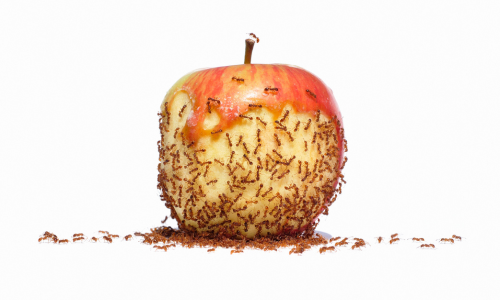
Expert Ant Control in Washington, NC
Welcome to Sentry Exterminating, your dedicated partner for specialized ant control in Washington, NC and surrounding areas.

Decades of Expertise in Ant Control Solutions
With over 50 years of dedicated Washington pest control experience, Sentry Exterminating has honed its expertise in tackling ant infestations in Washington, NC. Our extensive knowledge and proven methods guarantee effective solutions for our valued clients.

Don’t Let Ant Invaders Take Over Your Home
Are you dealing with a relentless invasion of fire ants, carpenter ants, or odorous house ants in Washington, NC? These small yet persistent creatures can quickly become a nuisance, finding their way into your living spaces, contaminating your food sources, and even causing structural damage. Don’t let them take over; it’s time to take action.
Our Commitment to Exceptional Ant Control
At Sentry Exterminating, your satisfaction is our priority. Our guarantee ensures that if ant problems persist between regular services, a simple call to us is all it takes for our technician to return promptly and address the issue without any extra cost to you. Your peace of mind matters to us.

Understanding the Ant Menace
Ants are social insects that thrive in communities, with each member playing a crucial role in supporting the colony’s survival. From worker ants searching for food to the ant queens responsible for creating new colonies, these pests follow pheromone trails and actively seek out water sources and food. Preventing their infestation requires a comprehensive approach, targeting the entire colony.

Targeted Expertise for Resolving Ant Infestations
Professional ant control is indispensable for effectively addressing ant infestations at their source. Our expert Washington pest control professionals can accurately identify the ant species, target the colony, and decisively resolve the issue. DIY solutions often merely manage the surface issue, leaving the core problem untouched and allowing the ant population to rebound.

The Vital First Step: Accurate Ant Identification
The initial and critical step in effective ant control is accurately identifying the specific ant species present. Different species have distinct behaviors and vulnerabilities, requiring tailored treatment approaches. Misidentifying the ant type may result in treatments that not only prove ineffective but can inadvertently worsen the infestation.
Common Ant Species in Washington, NC
Ants are a prevalent insect in Washington, NC, with various species exhibiting distinct characteristics and behaviors. Understanding these species is crucial for effective ant control measures. Here are some common ant species found in the region:
- Fire Ants: Known for their aggressive nature and painful stings, fire ants often build large mounds in lawns and gardens.
- Carpenter Ants: These ants can cause structural damage by excavating wood to build their nests, often found in damp or damaged wood.
- Odorous House Ants: Recognizable by their unpleasant odor when crushed, these ants often invade homes in search of food.
- Pavement Ants: Typically nesting under sidewalks and driveways, they can invade homes in search of sweet or greasy foods.
- Pharaoh Ants: Known for their small size and multiple queens in a colony, pharaoh ants can be challenging to control as they can split into subcolonies.
- Argentine Ants: Forming super-colonies, these ants are highly adaptive and often displace other ant species. They are attracted to sweet substances.
- Acrobat Ants: Named for their ability to contort their abdomen over their thorax, these ants often nest in trees and can bite if disturbed.
Identifying the specific ant species invading your space is the first step towards successful ant control in Washington, NC.

The Perils of DIY Ant Control
While DIY methods like ant traps and sprays might provide temporary relief, they often fail to eradicate the entire ant colony. These approaches might address the visible ants, but they rarely reach the heart of the problem—the queen and her colony. Additionally, the incorrect use of chemical compounds can lead to environmental and health concerns.

Enter the Ant Control Professionals
At Sentry Exterminating, we understand the unique challenges posed by different ant species, such as pavement ants, pharaoh ants, or Argentine ants. Our expert team is equipped with the knowledge and effective treatments to tackle each ant variety specifically. We locate access points, identify ant trails, and strategize to deliver targeted ant treatments, ensuring the best results for our clients.
Our Comprehensive Ant Control Process
At Sentry Exterminating, we employ a systematic approach to ant control to ensure effective and lasting results. Our process involves the following steps:
1. Assessment and Identification:
Our team begins by conducting a thorough inspection of your property to identify the ant species present and assess the extent of the infestation.
2. Customized Treatment Plan:
Based on our assessment, we develop a tailored treatment plan that targets the identified ant species and their nests, ensuring the most efficient approach.
3. Strategic Bait Placement:
We strategically place ant baits in areas of high ant activity, attracting the ants to consume the bait and share it with the entire colony.
4. Targeted Extermination:
Utilizing industry-approved ant killers and environmentally friendly solutions, we target the ant population, ensuring effective extermination while minimizing environmental impact.
5. Colony Elimination:
Our approach focuses on eradicating the entire ant colony, including the queen, to prevent future infestations and ensure a long-term solution.
6. Preventative Measures:
We advise on and implement preventative measures to deter future ant invasions, including sealing entry points and eliminating attractants.
7. Follow-Up and Monitoring:
After the initial treatment, we schedule follow-up visits to monitor the situation, ensuring the ant population is under control and making any necessary adjustments to the treatment plan.
Our commitment is to provide comprehensive ant control, delivering a pest-free environment for your home or business.

Ant Infestations and Structural Damage
Ant infestations extend beyond inconvenience, potentially causing substantial and costly structural damage to homes and buildings. Ants, such as carpenter ants, can hollow out wood, compromising the integrity of wooden structures and posing a danger to the safety of your property.

Ant Infestations as a Health Hazard
Beyond being a mere nuisance, ant infestations pose a significant health risk. Ants can contaminate food, surfaces, and even cause allergic reactions, highlighting the importance of swift and effective ant control to maintain a safe and healthy environment.
Diverse Risks of Ant Infestations
Ant infestations can lead to a range of other problems and potential risks, including:
Damage to Electrical Systems:
Ants are drawn to electrical fields, and they may nest in or around electrical systems, causing malfunctions or short circuits.
Garden and Crop Damage:
Certain ant species can damage plants and crops, impacting agricultural yields and gardening efforts.
Disruption of Outdoor Activities:
Fire ants and other aggressive ant species can make outdoor spaces uncomfortable and potentially dangerous for humans and pets.
Impact on Wildlife:
Invasive ant species can outcompete native species, disrupting ecosystems and affecting the native wildlife.
Invasion of Indoor Spaces:
Ants can invade indoor areas in search of food and suitable nesting sites, causing stress and discomfort.
Financial Costs:
Dealing with ant infestations involves financial expenses for pest control services, repairs, and replacement of damaged items.
Understanding the multifaceted risks of ant infestations emphasizes the importance of proactive ant control and prevention measures.

Targeting the Root Cause of Ant Infestations
At Sentry Exterminating, our focus is on addressing the root cause of ant infestations, not just alleviating the visible symptoms. We employ targeted strategies and thorough assessments to ensure a long-lasting solution by eradicating the entire ant colony and preventing future reoccurrences.

Restoring Harmony & Balance
At Sentry Exterminating, our mission is to bring equilibrium back to the ecosystem. We strive for harmony by carefully targeting and controlling pest populations to minimize their impact while promoting a sustainable coexistence between humans and nature. Our approach emphasizes a holistic view, considering the ecosystem’s well-being in all our Washington pest control measures.
Exploring the Wonders of Ant Biology
Ants, belonging to the order Hymenoptera, display remarkable characteristics that contribute to their success as social insects. While each ant species has its unique traits, some common features define these industrious creatures:
Social Structure: Ants are social insects, organizing themselves into colonies with distinct roles such as workers, soldiers, and queens. This division of labor is key to their efficiency and survival.
- Communication: Ants use pheromones for communication, releasing chemical signals to convey messages about food sources, danger, or mating. This sophisticated communication system allows for coordinated actions within the colony.
- Antennae and Sensory Perception: Antennae play a vital role in ant perception, serving as highly sensitive olfactory and tactile organs. They help ants navigate their environment, communicate, and detect pheromones.
- Mandibles: Ants possess powerful mandibles that aid in various tasks such as cutting and carrying food, constructing nests, and defending the colony. Their jaw strength varies based on their role within the colony.
- Metamorphosis: Ants undergo complete metamorphosis, progressing through egg, larval, pupal, and adult stages. This life cycle allows for specialization and adaptability within the colony.
- Exoskeleton: The exoskeleton of ants provides protection, structural support, and aids in minimizing water loss. However, it necessitates periodic molting (ecdysis) as they grow.
- Nesting Behavior: Ants exhibit diverse nesting behaviors, constructing nests underground, in trees, or even within man-made structures. Nest architecture varies based on the ant species and environmental conditions.
Understanding the intricate world of ant biology enhances our appreciation for these remarkable creatures and aids in developing effective ant control strategies.

Caring for Ants within our IPM Strategy
Incorporating ants into our Integrated Pest Management (IPM) strategy, we aim to respect their ecological role. This includes using environmentally friendly solutions, like ant baits, to minimize harm to beneficial species and maintain a balanced ecosystem while effectively managing pest populations. Our approach ensures that ant control is part of a broader commitment to environmental responsibility.

The Importance of Cleanliness in Ant Control
Maintaining cleanliness is a fundamental aspect of ant control, disrupting their foraging patterns and nesting opportunities. A clean environment denies ants access to food sources, making them less likely to establish colonies and infest living spaces. By removing crumbs, sealing food containers, and keeping surfaces clean, we minimize attractants and deter ant activity effectively.
Tips for Effective Ant Control and Prevention
Ant control and prevention are vital to maintain a pest-free environment. Here are some helpful tips to manage ant infestations effectively:
Eliminate Food Sources:
Keep your living spaces clean and free of crumbs or spills that could attract ants. Store food in airtight containers to limit their access to potential food sources.
Use Diatomaceous Earth:
Sprinkle diatomaceous earth, a natural insecticide, around entry points and ant trails. It’s an effective, non-toxic way to deter ants.
Leverage Essential Oils:
Use essential oils like peppermint, tea tree, or cinnamon as a natural ant repellent. Mix a few drops with water and spray around ant entry points.
Manage Water Sources:
Fix any leaks or areas with standing water in and around your home, as ants are attracted to moisture.
Boric Acid:
Utilize boric acid, a common active ingredient in ant baits, to target ants effectively.
Combat Fire Ants:
Address red imported fire ant problems with specific fire ant baits and individual mound treatments, prevalent in the southern United States.
Choose Effective Ant Killers:
Opt for bait products, ant killer sprays, or biological control methods to combat ants based on the type of infestation.
Mind the Entry Points:
Seal cracks and openings in walls, windows, and doors to prevent ants from finding their way into your home.
Strategically Place Bait Stations:
Position bait traps near ant trails and entry points for the best results in controlling ant populations.
Minimize Attractants:
Clean up pet food, sugary substances, and food debris promptly, reducing incentives for ants to invade your space.
Natural Repellants:
Deter ants by using natural repellants like lemon juice or cinnamon leaf in areas prone to ant activity.
Be Consistent with Treatments:
Apply ant control measures consistently to ensure you target the entire colony, not just a few individuals.
By implementing these strategies, you can effectively manage ants, whether dealing with nuisance pests or larger infestations.

Act Now, Secure Your Home
Do not let a small ant problem turn into a major pest issue. Contact Sentry Exterminating today to experience the best in professional ant control. Let us protect your home, ensuring a safe and comfortable environment for you and your family.
